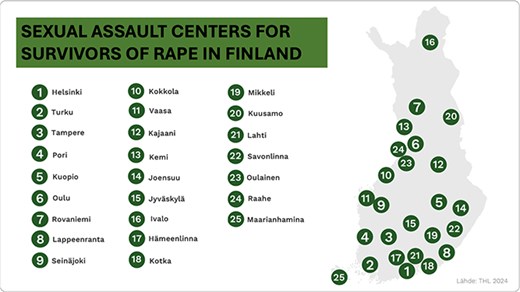-
PDF
- Split View
-
Views
-
Cite
Cite
K Kero, J Krogell, R Klami, S Pelkonen, R Korjamo, SEXUAL ASSAULT CENTERS FOR SURVIVORS OF RAPE IN FINLAND – NATIONAL ACUTE TREATMENT AND FOLLOW-UP PROTOCOL, The Journal of Sexual Medicine, Volume 22, Issue Supplement_2, May 2025, qdaf077.046, https://doi.org/10.1093/jsxmed/qdaf077.046
Close - Share Icon Share
Abstract
The Istanbul Convention, addressing domestic violence and violence against women, was published by the Council of Europe in 2012, with Finland ratifying it in 2015. The convention contains 81 articles, including Article 25, which requires member states to establish support centers for victims of rape. Additionally, article 22 mandates the provision of short- and long-term specialist support services for victims of violence. Article 25 further specifies that member states must provide adequate, easily accessible rape crisis or sexual violence referral centers, offering medical and forensic examinations, trauma support, and counseling for victims.
The Finnish Institute for Health and Welfare (THL), under the Ministry of Social Affairs and Health, manages a nationwide network of support centers for victims of sexual violence. These centers are staffed by multidisciplinary professionals, including midwives, nurses, doctors, psychologists, social workers, and hospital chaplains. The services are free and available to individuals over the age of 16, regardless of gender. Some centers also serve those aged 13 and older, with pediatric care available in children’s hospitals. Victims can access medical, forensic, and psychosocial support within a month of the incident. Reporting the crime to police is not a prerequisite for receiving care, although forensic samples are collected for potential future legal proceedings.
Finland’s first support center was established in Helsinki University Women’s Hospital in May 2017. As of summer 2024, there are 25 such centers across the country. These centers provide services to victims of severe sexual violence, including rape or attempted rape. Support can be sought within a month of the incident. Since the inception of the first center, more than 6000 rape survivors have been assisted.
Support centers coordinated and audited by the Finnish Institute for Health and Welfare ensure consistent and standardized support across the nation. Ongoing monitoring of service quality, visit numbers, staff training, and patient experiences provides valuable insight into the effectiveness of the support system. This, coupled with societal financial and other forms of support, strengthens the national response to sexual violence.
The authors have no conflict of interest.




